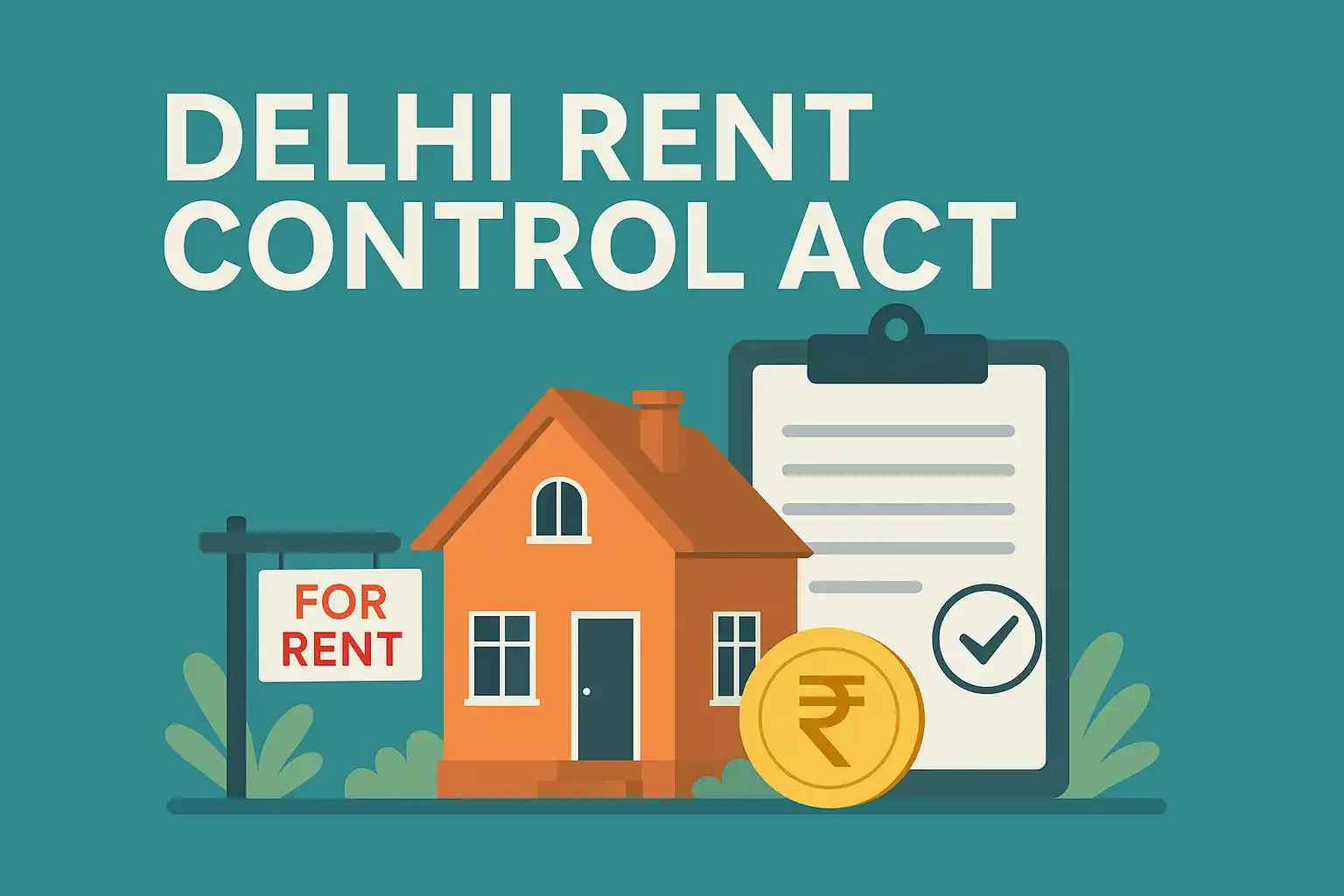All about the Delhi Rent Control Act
Updated on : 04 April 2025

Image Source: google.com
Introduction to the Delhi Rent Control Act
The Delhi Rent Control Act was enacted to regulate rent, protect tenants from arbitrary eviction, and ensure fair dealings between landlords and tenants. It primarily applies to properties built before 1988, setting rules on rent hikes and eviction conditions to maintain stability in Delhi’s rental market.

Image Source: linkedin.com
What is the Delhi Rent Control Act?
The Delhi Rent Control Act was introduced to regulate rent and protect tenants, especially the economically weaker sections. Though amendments like the 1988 reform aimed for balance, outdated rules still restrict landlords' rights, discouraging real estate investment.
Key Points:
-
✅ Early Rent Control Laws (1948 & 1958) – The Delhi and Ajmer-Mewara Rent Control Act, 1948, and Delhi Rent Control Act, 1958 were introduced to safeguard tenants, particularly the economically weaker sections.
-
✅ Tenant-Friendly Rules & Investor Disinterest – The Act imposed strict rent control and eviction restrictions, creating a lack of interest among investors in Delhi’s property market.
-
✅ 1988 Amendment for a Fairer Market – To encourage investment, properties with rent over ₹3,500 per month were exempted from rent control regulations.
-
✅ Reform Recommendations – Reports from the Economic Administration Reforms Commission (1980) and National Commission on Urbanisation (1985) suggested modifications to reduce the Act’s rigid nature.
Explore Properties in Delhi
- Builder Floors for Sale in New Ashok Nagar
- Builder Floors for Sale in Chhatarpur
- Builder Floors for Sale in Molar Band
- Builder Floors for Sale in Hari Nagar
- Builder Floors for Sale in Vikas Puri
- Builder Floors for Sale in Uttam Nagar
Key provisions under Delhi Rent Control Act
| Key Provisions | Description |
|---|---|
| Rent Payment Deadline | Tenants can pay rent by the 15th of every month if no specific date is mentioned in the rent agreement. |
| Receipt for Rent Payment | Tenants have the right to request a receipt from the landlord for the rent paid. |
| Eviction Protection | Landlords cannot evict tenants if rent is paid on time. |
| Rent Increase on Renovation | Rent can only be increased if the landlord renovates the property, with a maximum hike of 7.5% of the renovation cost. |
| Periodic Rent Increase | Rent can be increased by 10% every three years. |
| Subletting Rights | Tenants are allowed to sub-let the property, and landlords cannot object. |
You Might Also Like
Rent Control: How Fair Rent is Determined
The Delhi Rent Control Act establishes a system to regulate rent prices, preventing landlords from charging excessive amounts while ensuring tenants pay a reasonable sum. Fair rent is determined based on the following key factors:
✅ Standard Rent Calculation – The Act defines "fair rent" based on the cost of construction and land value at the time of property completion.
✅ Limited Rent Increase – Landlords can only increase rent under specific conditions, such as renovation, but the hike cannot exceed 7.5% of the renovation cost.
✅ Periodic Rent Revision – A 10% rent increase is allowed every three years to adjust for inflation and maintenance costs.
✅ Exemption for Higher-Rent Properties – Properties with a monthly rent exceeding ₹3,500 (as per the 1988 amendment) are not subject to rent control.

Image Source: google.com
Court petitions over the years
Several legal challenges have been filed against the Delhi Rent Control Act (DRC Act) due to its outdated provisions:
✅ Over 10,000 Cases – The Delhi High Court has seen 27.9% of civil rent cases under the DRC Act, which hasn’t been amended in over 30 years.
✅ 2010 Legal Challenge – Three lawyers and activists questioned the Act’s relevance, citing outdated regulations.
✅ 2024 HC Plea – Landlords challenged the constitutional validity of rent control, arguing it ignored market rates, but the plea was rejected.
✅ Supreme Court Appeal – The Committee for the Repeal of the DRC Act plans to take the case to the Supreme Court for landlord justice.
What are the challenges of the Delhi Rent Control Act?
The Delhi Rent Control Act protects tenants but limits landlords, discouraging investment. Outdated rules and strict controls have led to 10,000+ legal disputes.
| Challenge | Details |
|---|---|
| Outdated Law | No major amendments in 30+ years. |
| Low Investment | Strict controls deter property buyers. |
| Rent Hike Limits | Increase capped at 7.5% on renovation. |
| Eviction Issues | Difficult to evict tenants legally. |
| Legal Disputes | 10,000+ rent cases pending in courts. |
| Unfair Pricing | Rent control ignores market value. |
| Subletting Rule | Tenants can sublet without consent. |
Consequences of the archaic rent law in Delhi
The outdated Delhi Rent Control Act has led to low property investments, legal disputes, and rental market imbalances. Landlords face limited rent hikes and eviction issues, while tenants benefit unfairly. The lack of reforms continues to hurt the real estate sector.
Key Consequences:
✅ Decline in Property Investments – Investors avoid Delhi due to rigid rent laws and poor returns.
✅ Unfair Rent Control – Landlords cannot charge market-based rent, leading to low rental yields.
✅ Eviction Challenges – Tenants stay indefinitely, making it hard for landlords to reclaim properties.
✅ Rise in Legal Disputes – 10,000+ cases related to rent control are pending in courts.

Image Source: facebook.com
The solution Model Tenancy Act 2019
The Model Tenancy Act 2019 aims to replace outdated rent laws, ensuring a fair system for landlords and tenants. It promotes transparency, limits eviction grounds, and streamlines dispute resolution, encouraging investment in the rental market.
Key Features:
✅ Balanced rights – Protects both landlords and tenants, ensuring fair agreements.
✅ Limited eviction grounds – Clearly defines legal eviction conditions, reducing unfair removals.
✅ Rent dispute resolution – Provides a structured system for resolving landlord-tenant conflicts.
✅ Security deposit cap – Limits security deposit amounts to prevent excessive demands.
Tenant Rights and Protections
| Right/Protection | Details |
|---|---|
| Timely Rent Payment | Tenants can pay rent by the 15th if no date is mentioned in the agreement. |
| Rent Receipt | Tenants have the right to demand a receipt for rent paid. |
| Protection from Eviction | Cannot be evicted if rent is paid on time and lease terms are followed. |
| Fair Rent | Landlords cannot charge excessive rent beyond legal limits. |
| Right to Maintenance | Landlords must ensure proper upkeep of the property. |
| Dispute Resolution | Legal provisions exist for resolving conflicts with landlords. |
Explore Properties in Delhi
- Builder Floors for Sale in New Ashok Nagar
- Builder Floors for Sale in Chhatarpur
- Builder Floors for Sale in Molar Band
- Builder Floors for Sale in Hari Nagar
- Builder Floors for Sale in Vikas Puri
- Builder Floors for Sale in Uttam Nagar
FAQs
Que: Who does the Delhi Rent Control Act protect?
Ans: The Act primarily protects tenants by preventing arbitrary eviction and limiting rent increases, while also providing some rights to landlords.
Que: Can a landlord increase rent under the Delhi Rent Control Act?
Ans: Yes, but only under specific conditions such as property renovation. The rent hike cannot exceed 7.5% of the renovation cost.
Que: What are the grounds for evicting a tenant under this Act?
Ans: A tenant can be evicted for reasons like non-payment of rent, property misuse, landlord’s personal use, or unauthorized subletting.
Que: Are all rental properties in Delhi covered under this Act?
Ans: No, properties with a monthly rent above ₹3,500 (as per the 1988 amendment) are exempt from rent control provisions.
Que: Can tenants sublet a rented property?
Ans: Yes, the Act allows tenants to sublet the property unless restricted in the rental agreement.
Que: Is the Delhi Rent Control Act still relevant today?
Ans: Many provisions are outdated, leading to legal disputes. The Model Tenancy Act 2019 is proposed as a more balanced alternative.
India's Best Real Estate Housing App
Scan to Download the app

Explore Properties for Sale in Delhi:
- Builder Floors for Sale in New Ashok Nagar Delhi
- Builder Floors for Sale in Chhatarpur Delhi
- Builder Floors for Sale in Molar Band Delhi
- Builder Floors for Sale in Hari Nagar Delhi
- Builder Floors for Sale in Vikas Puri Delhi
- Builder Floors for Sale in Uttam Nagar Delhi
- Apartments for Sale in Vasant Kunj Delhi
- Apartments for Sale in Kalkaji Delhi
- Apartments for Sale in Chandan Hola Delhi
- Apartments for Sale in Uttam Nagar Delhi
- Apartments for Sale in Chhatarpur Delhi
- House for Sale in Uttam Nagar Delhi
- House for Sale in Jharoda Kalan Delhi
- Retail Shop for Sale in Narela Delhi
Explore Properties for Rent in Delhi:
- Apartments for Rent in Saket Delhi
- Apartments for Rent in Lajpat Nagar Delhi
- Apartments for Rent in Vasant Kunj Delhi
- Apartments for Rent in Greater Kailash Delhi
- Apartments for Rent in Chhattarpur Enclave Phase I Delhi
- Apartments for Rent in Malviya Nagar Delhi
- Apartments for Rent in Chhatarpur Delhi
- Apartments for Rent in Chittaranjan Park Delhi
- Apartments for Rent in Kalkaji Delhi
- Apartments for Rent in Neb Sarai Delhi
- Builder Floors for Rent in Saket Delhi
- Builder Floors for Rent in Chhatarpur Delhi
- Builder Floors for Rent in Paschim Vihar Delhi
- Builder Floors for Rent in Neb Sarai Delhi
- Builder Floors for Rent in Mukherjee Nagar Delhi
- 1 Rk Studio for Rent in Mukherjee Nagar Delhi
- 1 Rk Studio for Rent in Mayur Vihar Phase 1 Delhi
- 1 Rk Studio for Rent in Guru Teg Bahadur Nagar Delhi
- Office Space for Rent in Saket Delhi
- Office Space for Rent in Janakpuri Delhi
- Office Space for Rent in Patel Nagar Delhi
- House for Rent in Laxmi Nagar Delhi
- House for Rent in Todapur Delhi
Explore PG’s for Rent in Delhi:
- PG’s for Rent in Dwarka Delhi
- PG’s for Rent in Karol Bagh Delhi
- PG’s for Rent in Saket Delhi
- PG’s for Rent in Greater Kailash Delhi
- PG’s for Rent in Kalkaji Delhi
- PG’s for Rent in Hari Nagar Ashram Delhi
- PG’s for Rent in Vikas Puri Delhi
- PG’s for Rent in New Mahavir Nagar Delhi
- PG’s for Rent in Gujranwala Town Delhi
- PG’s for Rent in Kotla Mubarakpur Delhi
Explore Co-living options in Delhi:
- Sharing Room/Flats in Saket Delhi
- Sharing Room/Flats in Kalkaji Delhi
- Sharing Room/Flats in Chhatarpur Delhi
- Sharing Room/Flats in Safdarjung Enclave Delhi
- Sharing Room/Flats in Guru Teg Bahadur Nagar Delhi
- Sharing Room/Flats in Chittaranjan Park Delhi
- Sharing Room/Flats in Vasant Kunj Delhi
- Sharing Room/Flats in South Ex 2 Delhi
- Sharing Room/Flats in East of Kailash Delhi
- Sharing Room/Flats in Sheikh Sarai Delhi
- Sharing Room/Flats in Rohini Delhi
- Sharing Room/Flats in East of Kailash Delhi
- Sharing Room/Flats in Greater Kailash Delhi
- Sharing Room/Flats in Saket Delhi
- Sharing Room/Flats in Kalkaji Delhi
Buy, Sell & Rent Properties – Download HexaHome App Now!
Find your perfect home, PG, or rental in just a few clicks.
Post your property at ₹0 cost and get genuine buyers & tenants fast
Smart alerts & search helps you find homes that fit your budget.
Available on iOS & Android
A Product By Hexadecimal Software Pvt. Ltd.











